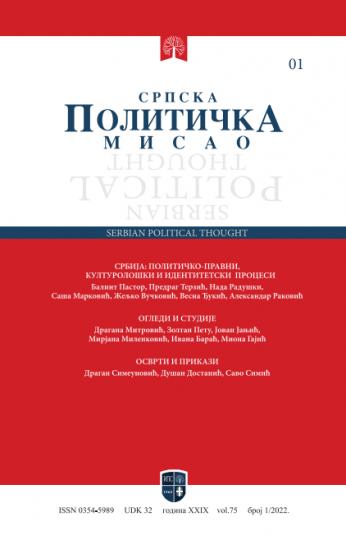NEW ELECTORAL LEGISLATION AND THE PRINCIPLE OF* REPRESENTATION: LAW ON THE ELECTION OF MEMBERS OF THE PARLIAMENT AND LAW ON LOCAL ELECTIONS
By analysing the legislative framework which, after two decades, significantly changes the election regulations and the principles of the legitimate constitution of government at the state and local levels, we tried to answer the question: do the newly adopted . . .
SEMI-INTELLECTUAL AS A FACTOR OF THE STATE AUTHORITY* DISRUPTION IN THE THEORETICAL THOUGHT OF SLOBODAN JOVANOVIĆ
The subject of this paper is semi-intellectual in the scientific perspective of Slobodan Jovanović. In his works, Jovanović paid special attention to the semi-intellectual, assuring readers of all the uselessness of this kind of individual, the one who persistently . . .
POSITION OF THE BULGARIAN NATIONAL MINORITY AND SERBIA'S ACCESSION TO THE EUROPEAN UNION
Based on the analysis of census statistical data, the paper studies the development, position, socio-economic and ethno-demographic characteristics of members of the Bulgarian national minority in Serbia. Following and comparing the results of successive state . . .
IN SEARCH FOR “CULTURAL NATIONALISM” OF SERBIAN POLITICAL THOUGHT
A text entitled “Cultural Nationalism” written by Isidora Sekulic, prompted contemplation of this topic. It was published in a journal “Novi Srbin” in Sombor in 1912, whose editor was Vasa Stajic. On the eve of the Great War, the Serbian national idea . . .
“THE DOUBLE OF THE STATE” MODEL IN CULTURAL POLICY OF SERBIA (1971-2021)
The subject of the paper is the "State Double" model, which has been developed by the dissident intellectual elite in the cultural policy of Serbia during the last fifty years, expressing disagreement with the ruling political and cultural currents.
The . . .
THE REPUBLIC OF SERBIA AND THE REPUBLIC OF SRPSKA – MUTUAL IDENTITY OF SERBIAʼS STATEHOOD
The work by analyzing and comparing the elements and symbols of the statehood of the Kingdom of Serbia, the Republic of Serbia, the Republika Srpska, and the Republika Srpska Krajina shows that, after the breakup of socialist Yugoslavia, the Republika Srpska . . .





